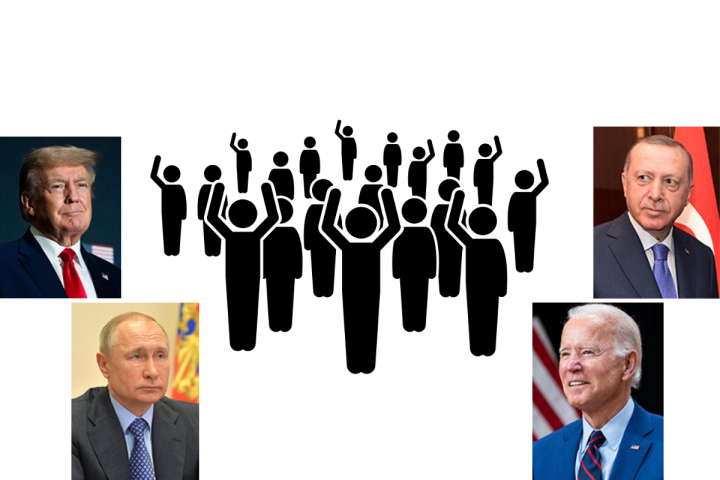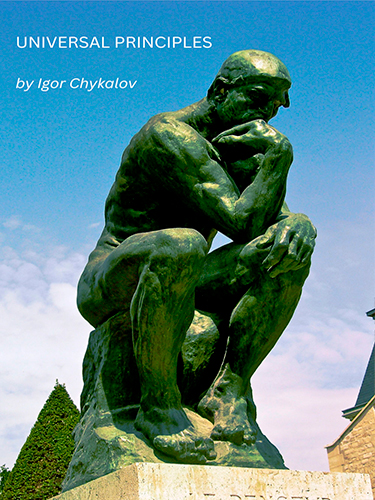European Parliament: Xenophobes vs. Xenophiles
Globalization brought humanity diversification, which turned into homogenization,
and the locals no longer like that. The elites do not listen to their people,
but impose their delusions on them. This explains the rise of the far right in the world.
and the locals no longer like that. The elites do not listen to their people,
but impose their delusions on them. This explains the rise of the far right in the world.
The regular elections to the European Parliament took place on June 6-9, 2024.
27 nations elected the EU's highest legislative body, consisting of 720 representatives. These 720 members are divided into conditional “left”, “right” and representatives of the center.
According to the election results, far-right parties won in Germany, Italy, France and slightly increased their presence in the European Parliament. This is perceived as a threat to democracy by liberals.
No, this is just the manifestation of real democracy and a reflection of the will of the people of EU countries, who want to pay more attention to their internal affairs and regain their national identity. This popular desire runs counter to their governments' delusions of democracy, human rights, equality and ultimately creates tension in these countries.
……….
Globalization brought humanity not only diversification, but also homogenization as the other side of the same coin.
Globalization brought humanity national diversity, which, taking into account the relative ease of migration and the promiscuity of many democratic countries in this matter, has turned into a form of homogenization and many local residents no longer like it. Many countries are losing their national identity. How?
For example, the European Football Championship Euro-2024 is currently underway in Germany and, naturally, each national team reflects the ethnic composition of its country. Look at the faces of French team players here. All they are French citizens. Is this really how you imagine the people of France?
I’m not racist or nationalist, I’m an observer and simply stating the fact: out of 25 players, 12 are black, i.e. it turns out that almost half of the inhabitants of France are from Africa. This is what is called the “loss of national identity,” which clearly occurred due to the incorrect immigration policy of the French authorities.
Therefore it is not surprising that the far right (Marine Le Pen with her National Rally, in particular) received 31% of votes in the national elections to the European Parliament against 14% of votes for centrist candidates supported by French President Emmanuel Macron. In my opinion, this is a huge difference. The French President accepted the challenge, immediately dissolved France's Parliament (the National Assembly) and called for urgent re-elections. Mr. Macron evidently hopes that the French will vote for his centrist parties and thus wants to put Marine Le Pen and the right in general in their place. Re-elections are scheduled for June 30 and July 7, and it is possible that the French far right will also win, putting Mr. Macron in his place. Let's see. Then they will have very good chances in the next French presidential elections in 2027.
……….
I called the article “European Parliament: xenophobes vs. xenophiles.” It could have been called “European Parliament: nationalists vs. internationalists” or “European Parliament: right vs. left.” It's all about the same thing.
And please don't get attached to the words. Many words carry a positive or negative meaning inherent in the upbringing and moral attitudes of a given nation (or group of nations) at a given time. For example, it is now believed that democracy and capitalism are “good”, and authoritarianism and socialism are “bad”. However, there is Putin's “democracy” in Russia, «guided capitalism» in the US, «authoritarianism» of Lee Kuan Yew in Singapore and «socialism» in Scandinavian countries.
So don't hold on to words, they're just symbols. Many people give the same words opposite meanings. Look at the actions.
……….
2 sides of the same coin: nationalism and xenophobia vs. internationalism and xenophilia.
Nationalism and xenophobia are the desire for national identity and the rejection of everything alien. This is an extreme.
Internationalism and xenophilia are the desire to borrow elements of the culture of other nations and the acceptance of everything foreign. This is another extreme.
Together, these are two sides of the same coin, which I would call the receptivity of a nation (or a person) to information from the outside world. Here (as elsewhere) the balance is needed; extremes are bad.
These concepts are directly related to the history, culture and ethnic composition of a particular nation. Previously, countries were more ethnically homogeneous, but since the beginning of the 20th century with the development of means of transportation and globalization, this homogeneity began to erode and many people moved to other countries. They brought their culture (worldview, religion, language, customs, behavior, food, etc.) with them there.
……….
My first xenophobe.
Erich from Hanover (Germany) was the first xenophobe I met in my life. I did not yet know that he was a xenophobe though because in 1996 this word was not in my vocabulary. At first glance, Erich looked quite a decent person.
He was Russian (and German, of course) -speaking ethnic German emigrant from somewhere in the outback of the Soviet Union where he was born and lived for about 30 years. I stayed a week at his house in Hanover in 1996, when I went there for the CeBit exhibition. He understood the USSR well, knew Germany and was a great patriot of the latter. For some reason I remember how he told me once: “I am against the EU common market. I don’t want to see French sausage with soy and all sorts of flavoring additives here. The sausage should contain only meat, lard and spices. I support the 18th century German law that prohibits adding anything else to sausage.”
And I could understand Erich perfectly.
Xenophobes do not like alien things. It's a cliché.
Do they dislike everything alien? Of course, not. Almost everyone enjoys döner kebab, for example, both in East and in West. However, I personally will be upset if it is impossible to buy Bratwurst mit Senf und Brot on the streets of Munich or Vienna, but just döner kebab. And many more will be upset, too. And Germans and Austrians, most likely, will not allow this to happen. And the point here is not about xenophobia, but about the correct proportion of the alien.
Germany (like any other country) is unique and should have its own unique face. That is why local residents love it and are proud of it.
……….
The number of immigrants directly affects the national identity of different countries.
Immigrants bring their culture to their new country and if there are too many of them, then this country loses its uniqueness, which is now called national identity, or vice versa, absorbs and mixes all cultures and creates its own separate poly-culture, consisting of many subcultures (as the US).
Yes, the USA is a country of emigrants. However, for around 250 years of its existence as an independent state, the country has already formed several generations of citizens who identify themselves as “Americans” and not as former British, Chinese, Indians or Poles. And all these people bring to the world the idea of American national identity (with all the diversity of internal subcultures), do not approve the immigration policy of their government and do not want to disappear into the waves of newcomers.
Since the issue of limiting immigration has recently become very noticeable in many countries of the world, the issues of nationalism/internationalism and xenophobia/xenophilia are also becoming very pressing. All right-wing parties understand that and oppose immigration, focusing voters' attention on the internal problems of their countries and national rather than international interests. That’s right, however, as I already wrote, the problem is not the immigration itself, but the number of immigrants.
The immigration problem is largely far-fetched.
Many democratic developed countries as good Christians have become so obsessed with protecting the rights of whoever that they have forgotten their own ones. They voluntarily have imposed on themselves a non-existent obligation to help others and thus created a problem for themselves. The number of immigrants in these countries has greatly increased recent times and created some nuisance for the locals, but the governments keep clinging to their delusion despite the common sense. Naturally, the locals start voting right-wing.
The process of accepting immigrants into a country can be compared to a blood transfusion in medicine. The blood should be suitable for the patient’s blood group and there should not be too much of it. Therefore, the number of immigrants in any country must be kept within certain limits, otherwise there will definitely be a crisis, since some (quite large) part of the local residents will not want to accept a foreign culture. And then they, in particular, will vote for the right, which is not a problem, but simply an indicator that the left is leading the country in the wrong direction.
I have already given an example of a very correct attitude towards immigrants in semi-authoritarian Turkey: the Turkish authorities act in a way that benefits just them. They easily turn on immigration programs when they need them and easily stop them when they no longer need them. And they rarely explain their actions and do not argue about the rights of unfortunate immigrants.
……….
Referendums as a necessary element of feedback for governments.
Governments of different countries generally love to lead their voters, but they just need to listen to their people. To achieve this, governments must hold referendums. Firstly, they need to know the opinion of the people and lead in the direction that the people like. This is populism with a plus sign, and this is what politicians are elected for. And yet in the event of claims or revolution in the country, the government always could say: “we just carried out your will.”
And secondly: any system without feedback is inviable.
Governments of different countries usually do not like referendums (for example, the United States do not have them at federal level), but only conduct public opinion polls which can be easily ignored. Apparently, this is done deliberately, because the authorities can hear very unpleasant things at the referendum, but this is the feedback they really need to correct their point of view.
Governments of different countries do not like referendums (and polls, too) because they always show the truth and then something needs to be done about it. Something always needs to be done about the truth, so it is always inconvenient. The golden dream of any government is to put the process of governing the country into automatic mode, sit down, loosen the tie and put the hands behind the head and the feet on the table.
Of the developed countries, only Switzerland actually regularly holds referendums and many consider it a country with very effective democracy.
……….
Every government has its own principles (delusions).
A good example of how the government is leading its people in the wrong direction against their will is the attitude of the US Democrats and President Biden towards immigration. From spring 2021, about 200 thousand immigrants on average cross the southern border of the US per month. Many public opinion polls have shown that a majority of Americans are seriously concerned about this. The Democrats did not want to deviate from their principles (delusions), as a result Mr. Biden's rating dropped and now the issue of illegal immigration may prevent him from winning the US presidency for a second term in November 2024. On June 4, Mr. Biden was forced to issue an executive order that prevents migrants from seeking asylum at the US-Mexico border when crossings surge. This could have been done earlier, but principles/delusions got in the way.
The government should not lead the people, but simply listen to them, offer options, receive feedback through referendums, create a plan and only then lead the country in accordance with the plan.
This is a recipe for the longevity of any government.
……….
In the EU there is another idée fixe. For some reason, they do not want to allow any country to leave the EU (multi-year Brexit only emphasizes this reluctance), and the matter turns into endless debts of Greece and Italy, systematic blocking of EU policy by Hungary... And the next 6 months Hungary should chair the Council of Europe and this is a problem. At first the Europeans rushed to accept Hungary, now they don’t want to kick it out and have to constantly bargain and make concessions to wayward Hungarian Prime Minister Viktor Orban.
Any union, and especially the European Union, must be a union of like-minded people. If Hungary constantly doesn’t like something, it should be expelled, and not kept in the EU at any cost.
……….
The period of deglobalization is coming.
I wrote about this.
In recent elections, the far-right parties slightly increased their presence in the European Parliament: they are now about 24%. At the next elections (in 2029), I think, their number will increase that much so they will be able to dissolve the EU, which, in my opinion, is an artificially created union of “Crayfish, Swan and Pike”.
Any union is based on fair exchange of energy (contribution and responsibility), so it is useless to harness such different countries as Greece/Bulgaria and Germany/France, for example, into one cart. Some will only take and use, while others will only give and get upset.
Ultimately such a union will fall apart.
Comment
✚ Add comment








